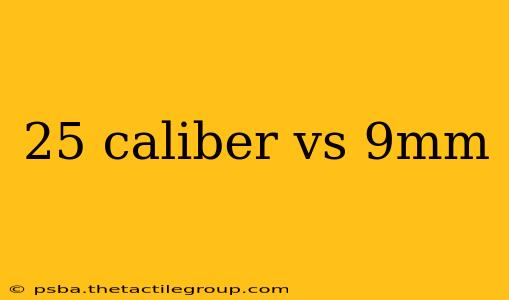Choosing the right caliber for self-defense or concealed carry is a critical decision, demanding careful consideration of various factors. This in-depth comparison of the .25 ACP (Automatic Colt Pistol) and the 9mm Parabellum will help you understand the key differences and determine which might be a better fit for your needs. We'll explore ballistics, stopping power, recoil, capacity, and overall suitability for self-defense.
Ballistics: A Tale of Two Calibers
The most significant difference between the .25 ACP and the 9mm lies in their ballistics. The .25 ACP is a significantly smaller and weaker round.
-
.25 ACP: This diminutive cartridge boasts a relatively low muzzle velocity and energy. Its small bullet diameter limits its ability to cause significant tissue damage. It's often characterized by its low recoil and ease of handling, but these advantages come at the cost of stopping power.
-
9mm: The 9mm, on the other hand, delivers substantially higher muzzle velocity and energy. This translates to significantly greater stopping power and penetration, making it a far more effective round in self-defense situations. Its larger bullet diameter creates a wider wound channel, increasing the likelihood of incapacitating an attacker.
Table Summarizing Key Ballistic Differences:
| Feature | .25 ACP | 9mm Parabellum |
|---|---|---|
| Bullet Diameter | 0.25 inches (6.35mm) | 0.355 inches (9mm) |
| Muzzle Velocity | Relatively Low | Relatively High |
| Muzzle Energy | Significantly Lower | Significantly Higher |
| Penetration | Low | Moderate to High |
| Stopping Power | Low | High |
Recoil and Shootability
The difference in recoil is substantial.
-
.25 ACP: The .25 ACP's low recoil makes it exceptionally easy to shoot, even for individuals with limited experience or physical strength. This ease of handling can contribute to faster follow-up shots.
-
9mm: The 9mm has noticeably more recoil. While manageable for most shooters, it requires a firmer grip and more practice to master. The increased recoil can affect accuracy, especially for beginners.
Capacity and Concealability
Both calibers are commonly found in small, easily concealable firearms.
-
.25 ACP: Many .25 ACP pistols are exceptionally small and lightweight, making them ideal for deep concealment. However, their magazine capacity is generally limited to 6-8 rounds.
-
9mm: 9mm pistols range in size and capacity. While larger than many .25 ACP pistols, numerous compact and subcompact 9mm options allow for comfortable concealment. Their magazine capacity is typically higher, ranging from 10-17 rounds.
Stopping Power and Self-Defense Effectiveness
The difference in stopping power is arguably the most crucial factor.
-
.25 ACP: The .25 ACP's low stopping power significantly limits its effectiveness in self-defense situations. While it can stop an attacker, it's far less reliable than the 9mm. The small bullet may not penetrate deeply enough to reach vital organs, and its low energy may not reliably incapacitate an attacker.
-
9mm: The 9mm offers far greater stopping power, significantly increasing the chances of quickly incapacitating a threat. Its higher energy and greater penetration drastically improve its effectiveness in self-defense scenarios.
Conclusion: Choosing the Right Caliber
The choice between .25 ACP and 9mm largely depends on your priorities and individual circumstances. The .25 ACP is a viable option for those prioritizing extreme concealability and ease of handling, but only as a last resort when other options are unavailable. Its limited stopping power makes it a less reliable choice for self-defense compared to the 9mm.
For most self-defense and concealed carry applications, the 9mm's superior stopping power, greater capacity, and relatively manageable recoil make it the far more effective and recommended choice. While the recoil is higher, the increase in stopping power significantly outweighs the additional recoil management. Always practice responsibly and choose the caliber and firearm that you can handle safely and effectively. Consider professional firearms training to improve your skills and confidence.

